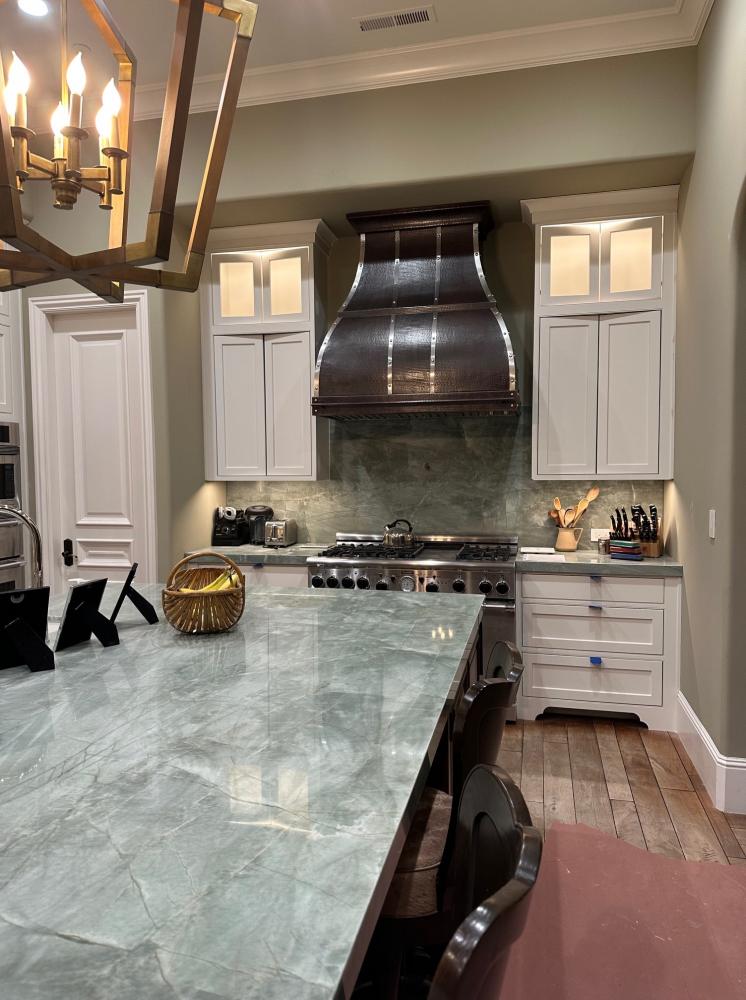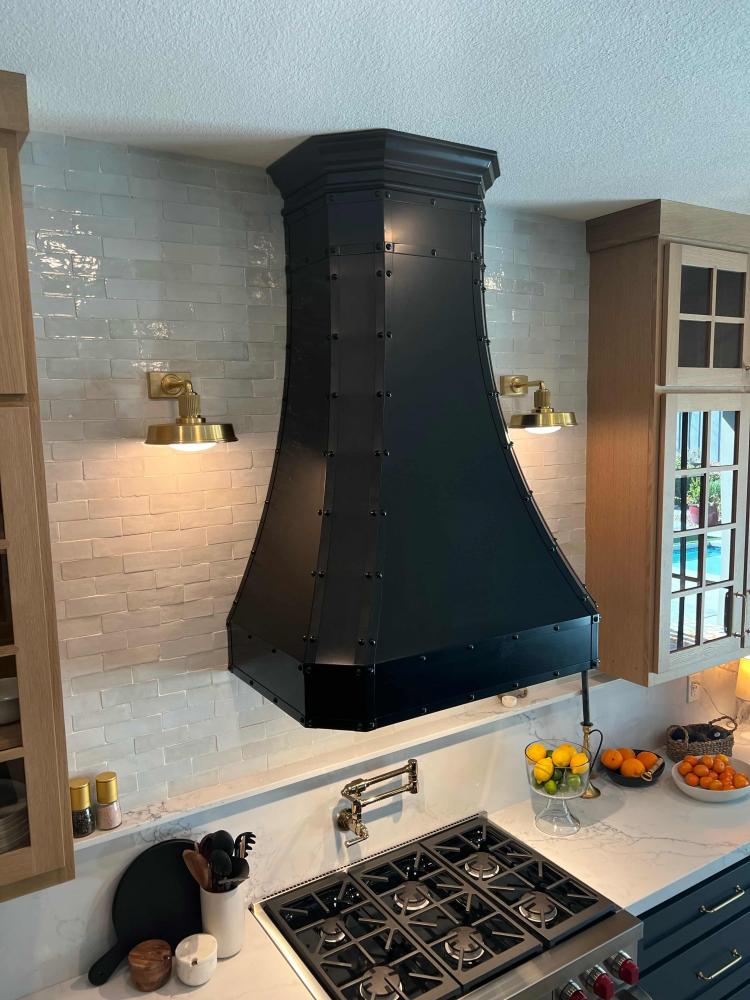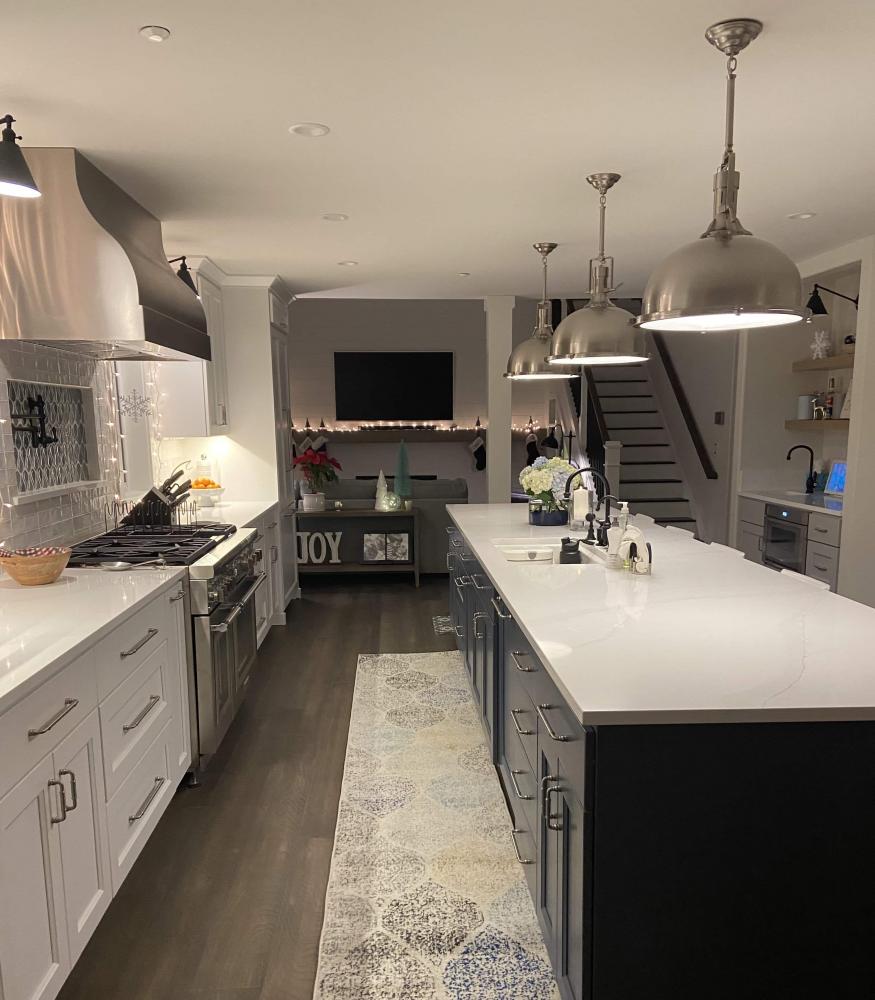A range hood is an essential appliance in any kitchen, providing ventilation and removing airborne particles such as smoke, steam, grease, and odors. In this comprehensive guide on range hoods, we will delve into the various types of hoods available for your cooking space.
Discover the difference between a standard hood and a vent range hood - each with its own set of advantages to consider. For those using gas stoves, learn how high temperatures can impact your choice of range hood.
We will also address specific regional requirements regarding range hoods by exploring whether or not a vent is necessary in states like Pennsylvania, New Jersey, California, and Texas. Stay tuned to make an informed decision when selecting the perfect range hood for your home or project. You'll want to choose from custom options to get the best exhaust stove hood!
What is a Range Hood?
A range hood, also known as a vent hood or kitchen hood, is an appliance typically mounted above ranges or cooktops to remove airborne grease, smoke, and odors produced during cooking. It does this by using a fan to draw in the air and either filter it through charcoal filters (recirculating hoods) or expel it outside through ductwork (vented hoods). This helps maintain good indoor air quality while keeping your kitchen free from unpleasant smells and high temperatures.
Is a Range Hood Required by Code?
In most cases across the United States, building codes do not specifically require homeowners to install a range hood when constructing or remodeling their kitchens. However, some local jurisdictions may have stricter regulations concerning proper ventilation based on factors like energy efficiency standards or fire safety considerations.
While not always required by code, range hoods can provide significant benefits in terms of safety, comfort, and air quality.
Commercial Kitchen Hood Code Requirements
Understanding the code requirements for commercial kitchen hoods can help ensure your establishment remains compliant with local regulations while providing a safe and comfortable environment for staff and customers alike.
Is it OK to not have a range hood?
In some cases, it may be acceptable to not have a range hood installed in your kitchen. However, this choice should be based on considerations such as the type of cooking apparatus utilized, ventilation alternatives available, and any particular building codes or regulations that may apply to your locale.
Is a range hood necessary?
A range hood is necessary if you want to effectively remove smoke, grease particles, odors, heat, and steam generated during cooking from your kitchen space. This helps maintain good indoor air quality by preventing these pollutants from spreading throughout the home or workspace.
Is a hood vent necessary?
While not necessary, a vented range hood provides superior performance compared to non-vented options because it actively removes contaminated air rather than simply recirculating it through filters back into the room.
Kitchen Ventilation Alternatives:
- Microwave Exhaust Fans: Some over-the-range microwaves come equipped with built-in exhaust fans that can help remove smoke and odors, but they may not be as effective as a dedicated range hood.
- Window Exhaust Fans: Installing an exhaust fan in a nearby window can provide some ventilation, but it may not be sufficient for high-volume cooking or kitchens with limited natural airflow.
- Downdraft Ventilation Systems: Downdraft systems are installed behind the cooktop and draw air downward before venting it outside. While these systems save space, their effectiveness is often debated due to their lower suction power compared to traditional range hoods.
Is kitchen ventilation necessary?
Kitchen ventilation is essential for maintaining good indoor air quality and preventing health issues related to exposure to airborne pollutants generated during cooking. Inadequate ventilation can bring about respiratory difficulties, sensitivities, mold development, and other negative impacts on inhabitants' prosperity.
Additionally, proper kitchen ventilation helps prevent grease buildup on surfaces which could pose fire hazards if left unaddressed over time.
Vent Range Hood
Maintaining a clean kitchen and healthy indoor air quality is key for any family, so investing in a vent range hood is an important decision.
Do I Need a Range Hood for a Gas Stove?
Yes, having a range hood installed above your gas stove is highly recommended due to the combustion process that occurs while cooking with gas appliances. Due to the combustion process of natural gas or propane, pollutants such as carbon monoxide, nitrogen dioxide and water vapor can be released into your home if not properly vented out - hence why a range hood is highly recommended.
Is It Illegal to Not Have a Range Hood?
In most cases, it's not illegal to have no range hood in your kitchen; however, local building codes may require one depending on factors like the type of appliance being used (gas vs electric) or whether there are windows nearby that can provide adequate ventilation when opened during cooking activities.
Is a Range Hood Vent Necessary?
A range hood vent may not be essential, depending on circumstances like the kitchen's dimensions, how often you prepare food with high heat or strong aromas and if there are other ventilation sources (e.g., windows). However, installing one will significantly improve indoor air quality by removing pollutants generated during cooking activities.
What Happens If You Don't Have a Range Hood?
If you don't have a range hood installed in your kitchen, several issues could arise over time:
- Poor indoor air quality due to lingering smoke and odors from cooking
- Increase in humidity levels which can lead to mold growth
- Grease buildup on walls and cabinets causing damage or discoloration
- Potential health risks associated with long-term exposure to harmful gasses produced by gas stoves (source)
While it's not always mandatory to have a range hood, the benefits of installing one far outweigh any potential drawbacks. Consider your specific kitchen needs and consult local building codes before making a decision.
Gas Stoves
A gas stove is a popular choice for many homeowners due to its efficiency and precise temperature control. Though it may be uncertain whether or not a vent hood is essential when using a gas stove, this article will delve into the necessity of such an appliance and some usual circumstances.
Do You Need a Vent Hood for an Electric Stove?
While electric stoves do not produce combustion byproducts like gas stoves, they still generate heat and moisture that can cause discomfort in your kitchen space. A range hood helps remove these elements from the air, improving indoor air quality and making your cooking experience more enjoyable.
Although not required by code in most states, having proper ventilation is always recommended.
Can You Have a Stove Without a Vent Hood?
In certain situations where installing a range hood may be difficult or impossible (such as small apartments), alternative solutions like downdraft vents or window fans can help provide adequate ventilation while cooking on either electric or gas stoves.
How to Vent a Gas Stove in an Island
- Downdraft vent: This type of system pulls smoke and fumes downward through vents installed behind the cooktop surface before expelling them outside via ductwork beneath the floor.
- Ceiling-mounted island range hood: These units hang above your island cooktop and use powerful fans to draw in smoke, steam, and odors before venting them outside through ductwork installed in the ceiling.
- Recirculating range hood: If you cannot install a ducted system, consider using a recirculating range hood that filters air through charcoal filters before returning it back into your kitchen. While not as effective at removing contaminants as vented hoods, they can still provide some level of ventilation for island gas stoves.
Why Does a Gas Stove Not Need to Be Vented?
In most cases, gas stoves do require proper ventilation due to the combustion byproducts produced during cooking. However, certain modern models with sealed burners and low BTU output may be considered "vent-free" or "unvented."
Can I Use an Electric Stove Without a Vent?
An electric stove does not produce harmful combustion byproducts like carbon monoxide or nitrogen dioxide; therefore, it is possible to use one without installing a dedicated vent system. However, having proper kitchen ventilation remains crucial for managing heat buildup and moisture generated while cooking on any type of appliance - including electric stoves.
Is a Range Hood Vent Necessary in Pennsylvania?
In Pennsylvania, range hood vents are not explicitly required by the state's building code. However, they may be recommended depending on the type of installation and local building codes. It is essential to consult with your local municipality or a professional contractor to determine if a range hood vent is necessary for your specific situation.
Why Consider Installing a Range Hood Vent
A range hood serves several purposes in the kitchen, including removing excess heat, steam, grease particles, and odors produced during cooking. This helps maintain indoor air quality and prevents damage to walls and cabinets from high temperatures and moisture.
- Air Quality: A well-functioning range hood can help improve indoor air quality by filtering out pollutants such as smoke, grease particles, carbon monoxide (especially when using gas stoves), nitrogen dioxide (NO2), and formaldehyde (HCHO) which are harmful to human health.
- Maintaining Kitchen Cleanliness: Grease particles that accumulate on surfaces over time can be difficult to clean; having an effective ventilation system will reduce this buildup.
- Safety: By removing potentially hazardous gasses like carbon monoxide from gas stoves or excessive heat generated while cooking at high temperatures, installing a range hood vent contributes significantly towards ensuring safety within your home environment.
Pennsylvania Building Code Requirements
The Pennsylvania Uniform Construction Code does not specifically require residential kitchens to have range hoods installed. However, it does mandate that all dwelling units must provide proper mechanical ventilation systems capable of exhausting stale air outside the building.
Is a Range Hood Vent Necessary in New Jersey?
In New Jersey, range hood vents are not explicitly required by the state building code. However, it is essential to consider local building codes and recommendations depending on the type of installation you have in your kitchen. Many homeowners and interior designers still choose to install range hoods for their numerous benefits.
Benefits of Installing a Range Hood Vent
- Air Quality: Installing a range hood vent helps improve indoor air quality by removing smoke, grease, odors, and potentially harmful pollutants produced during cooking.
- Temperature Control: Cooking at high temperatures can increase the heat levels inside your home. A well-ventilated kitchen with a range hood will help maintain comfortable temperatures while cooking.
- Maintaining Cleanliness: Grease particles that accumulate over time can be challenging to clean without proper ventilation. A range hood vent prevents these particles from settling on surfaces throughout your kitchen.
- Better Lighting: Most modern range hoods come equipped with built-in lighting features that provide better visibility while cooking.
Consulting with an experienced contractor or builder who is knowledgeable about both New Jersey state and local regulations can help you determine whether a range hood vent is necessary for your situation. You may also want to visit the official website of the New Jersey Department of Community Affairs Division of Codes & Standards, where you can find more information about residential construction codes and requirements.
Is a Range Hood Vent Necessary in California and Texas?
In both California and Texas, range hood vents are not explicitly required by statewide building codes. However, it is essential to consider the type of installation, local building codes, and the specific needs of your kitchen when deciding whether or not to install a range hood vent.
California's residential code does require mechanical ventilation for kitchens but doesn't specifically mandate that this must be achieved through a range hood vent. Similarly, Texas' International Residential Code (IRC) also requires proper kitchen ventilation without specifying the exact method.
To help you make an informed decision about installing a range hood vent in California or Texas, here are some factors to consider:
- Type of cooktop: Gas stoves produce more heat and moisture than electric ones; therefore, having proper ventilation becomes even more critical with gas appliances.
- Kitchen layout: The size and design of your kitchen can affect air circulation. A smaller space might benefit from additional ventilation provided by a range hood vent.
- Cooking habits: If you frequently cook at high temperatures or prepare dishes that generate significant smoke or odors (e.g., frying), investing in a quality range hood could improve indoor air quality significantly.
- Air quality concerns: Poor indoor air quality can lead to respiratory issues and other health problems. Installing a range hood vent helps remove harmful pollutants, such as carbon monoxide and nitrogen dioxide, produced during cooking.
- Local building codes: While statewide codes may not require range hoods explicitly, some local jurisdictions might have stricter regulations in place. Always consult your local building department for specific requirements.
Frequently Asked Questions
Below are some of the most frequently asked questions about range hood vents.
Do Range Hoods Make a Difference?
Yes, range hoods make a significant difference in maintaining indoor air quality by removing smoke, grease, and odors from cooking. They also help dissipate heat and humidity generated during cooking, preventing mold growth and damage to cabinets or countertops.
What Is the Importance of Range Hoods?
The primary importance of range hoods lies in their ability to filter out airborne contaminants produced during cooking. This includes smoke, steam, grease particles, and harmful gasses like carbon monoxide or nitrogen dioxide.
What Do I Need to Know About Range Hoods?
You should consider factors such as size compatibility with your cooktop area; ducted vs non-ducted options; noise levels; CFM (cubic feet per minute) rating for adequate ventilation power; ease of cleaning filters; lighting features; energy efficiency ratings (ENERGY STAR certified).
What Is the Disadvantage of a Range Hood?
A potential disadvantage could be increased energy consumption due to its operation. However, this can be mitigated by choosing an ENERGY STAR-certified model that offers efficient performance while minimizing environmental impact.
Conclusion
If you live in Pennsylvania, New Jersey, California or Texas it's important to know whether a range hood vent is necessary for your home. Before making any changes to your kitchen, it is important to consult local authorities regarding the applicable building codes.
If you're looking for high-quality range hoods that are both functional and stylish be sure to check out World CopperSmith. Their selection of copper range hoods and copper tables will not only improve the air quality in your home but also add a touch of elegance to your kitchen decor. Contact World CopperSmith today to get started on upgrading your kitchen!




